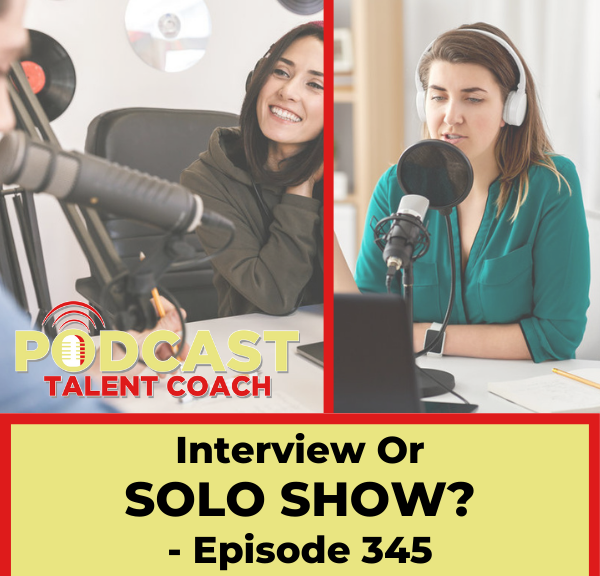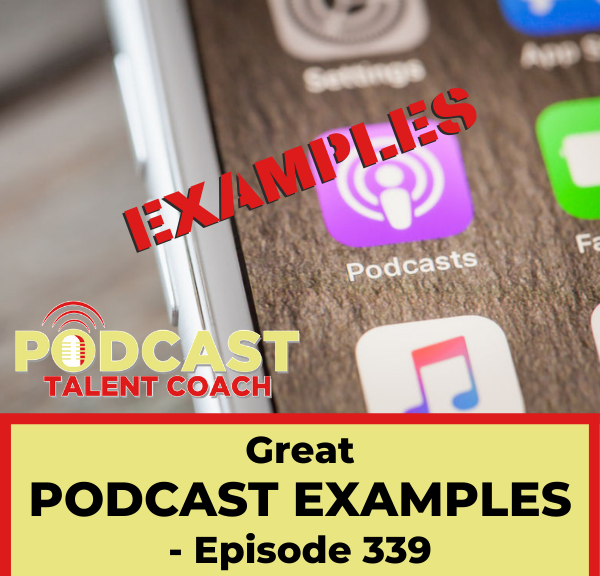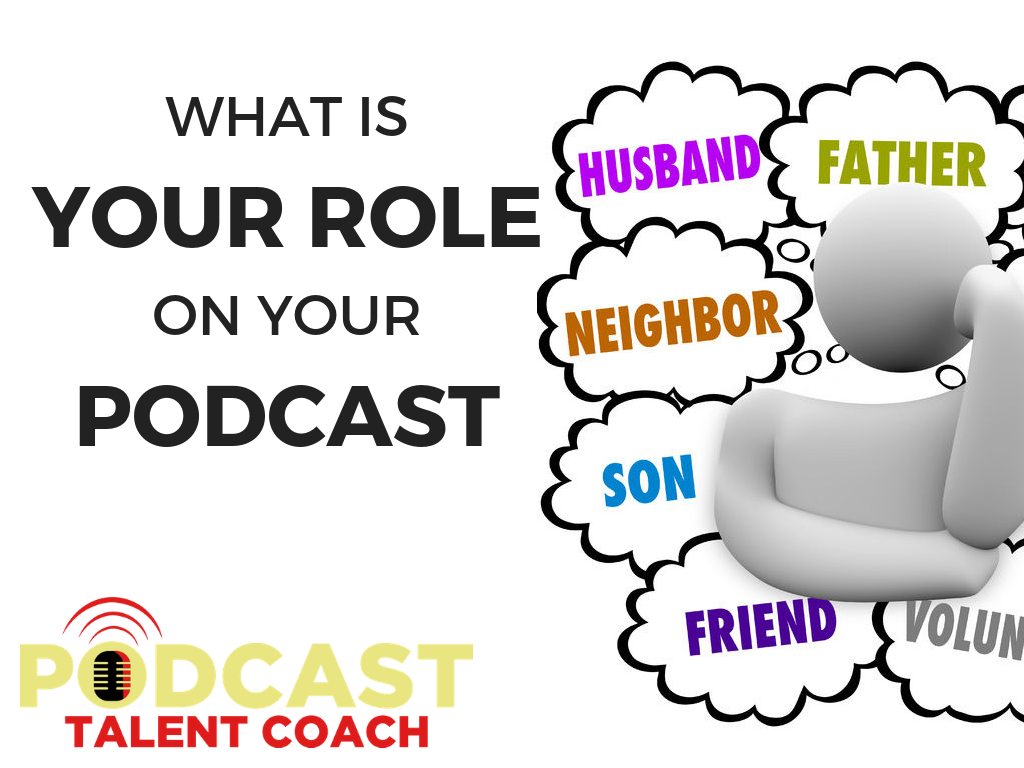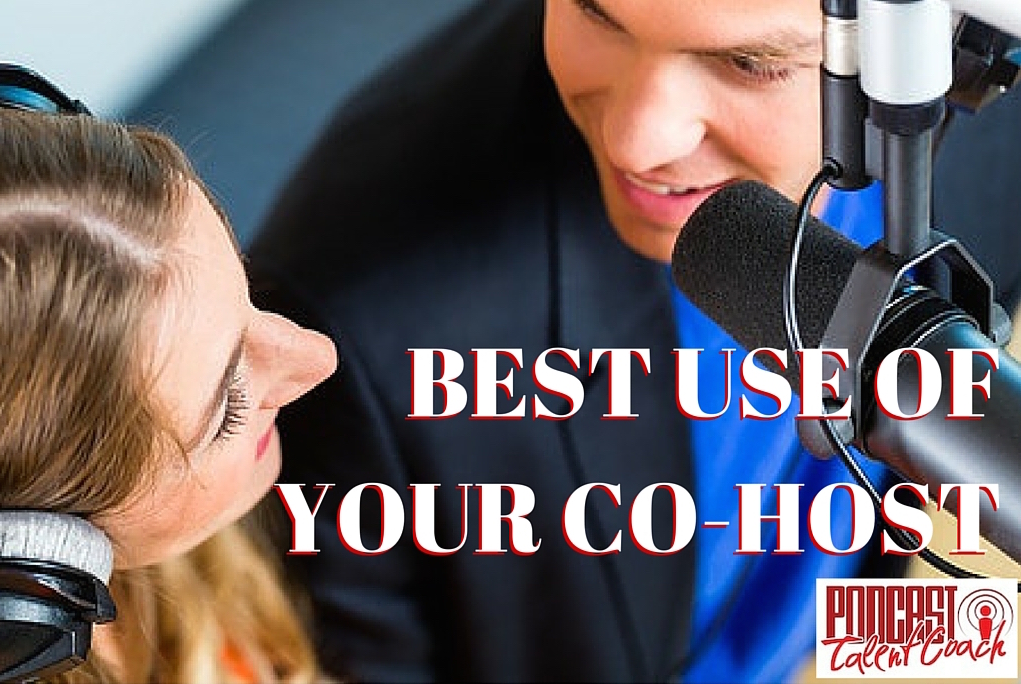Podcast: Play in new window | Download
Subscribe:
On the show today, I want to give you a few podcast examples that will help you in various areas of your show. These are podcasts that I feel do many things well that you can model.
We will also talk about a few of my past episodes. After over 330 podcast episodes, you and I have discussed quite a few topics.
I looked at my stats the other day and pulled up my 6 most popular shows. If you are looking for the episodes that have had the most impact, you can give these a listen to help you on your podcast journey as well.
You can find a link to all of these podcasts in the show notes at www.PodcastTalentCoach.com/examples.
THE BEST
Picking the best is always subjective. What I like you may not. That’s the great thing about podcasting. If you don’t like one host or show, you can probably find a dozen other shows on the same subject.
The quality of podcast examples depends on the niche and your tastes. Just like radio formats. One size definitely does NOT fit all.
I will give you a few that I feel do well in particular areas. You can take a listen and decide for yourself.
INTERVIEWS
In terms of hosts that conduct solid interviewers, there are three that I really like.
Malcolm Gladwell on Broken Record does great interviews, though he isn’t the only host of the show. The show is sort of album liner notes come to life. Broken Record brings you conversations with artists in a world without liner notes for a new audience of music lovers.
Michael O’Neal on the Solopreneur Hour podcast is a great interviewer. He creates real conversations. They can sometimes be a bit long.
Solopreneur Hour is a podcast of lively conversations, candid insights and bold advice for proudly unemployable people who are primed for real prosperity and fulfillment. Michael talks with the best and brightest solopreneurs from all walks of life.
Barbara Corcoran has a lot of fun with her inteviews on Business Unusual. You know Barbara from Shark Tank. She reminds me of my mom and has tons of fun.
I really like the older episodes before COVID hit. Her conversations with listeners were a lot more engaging.
In the description, Barbara says, “Life is too short to waste your time practicing someone else’s fancy theory on success. I give you the straight talk and the confidence to get there.”
Though I’m not a big fan, Howard Stern does amazing interviews. He usually asks exactly what the listener is thinking.
CO-HOSTS
When it comes to co-hosts, you need to ensure hosts have different personalities and opinions. If both are the same, one of them isn’t necessary.
Matthew and Elysha Dicks host Speak Up Storytelling podcast. This is a great example of co-hosts who compliment each other quite well. Unlike most storytelling podcasts, which offer you one or more outstanding stories to listen to and enjoy, this podcast seeks to entertain while also providing some specific, actionable lessons on storytelling.
Screw The Nine To Five podcast is hosted by husband and wife team of Jill and Josh Stanton. They are real, sometime brash and always funny.
This is a great example of two personalities really playing off each other. They have the same goal, but different approaches.
BUSINESS
Shane Sams on the Flipped Lifestyle podcast does a great job at giving you ideas you can actually use. This isn’t just tips and tricks found on the internet. Shane has done it.
The thing I love about Shane’s podcast is that he promotes his membership site and courses without being over-the-top salesy. This is a great example of using your show to drive your business without being a total infomercial.
Marc Mawhinney hosts the Natural Born Coaches podcast. He helps coaches. Pretty obvious. Love the title.
Marc uses his podcast to boost his JV relationships. He is typically interviewing experts in the online space. They provide great information. At the end of most episodes, they invite you to a webinar. This is a great example of leveraging interviews to drive revenue.
SOLO
One of the best solo shows I listen to is 48 Days To The Work You Love with Dan Miller. Dan spends 48 minutes every week answering questions. He is engaging and captivating having a conversation directly with you while doing it all on his own.
Dave Jackson over at School of Podcasting also does a solid solo show. Carrying a show by yourself and connecting with the listener isn’t easy. Dave does it every week. If you’re looking for another great show about podcasting, check out Dave.
Let’s get into the six most popular episodes of Podcast Talent Coach.
YOUR VOICE
The first is Like Your Voice – PTC223.
“I hate the way I sound.”
I hear that complaint quite often. Many people do not like the sound of their own voice. It is quite common.
It is also quite natural to dislike the sound of you own voice when hearing a recorded version of it. When you talk, the bones in your head vibrate adding to the qualities you naturally hear. When you hear a recording of your voice, those vibrations are absent causing your voice to sound different to you.
The natural bone vibrations also make you do some unnecessary acrobatics with your voice when using headphones. The bone vibrations combined with the enclosed nature of your headphones cause you to hear the big announcer voice in a much different way the listener hears it. You tend to speak in ways you don’t normally speak in everyday conversation.
The thing we fear most is not death but humiliation.
Listeners can tell in the first few words if you are excited and in the zone.
Your inner critic never congratulates you.
There are seven steps you can take to make your voice sound more natural and get you on the path to enjoying the sound of your voice. You will discover all seven in this episode.
DOWNLOADS
The next is How To Increase Your Downloads – PTC209.
Most of us want to grow our audience, increase downloads and become more influential in our niche. I recently conducted a survey asking about your biggest challenges with regard to your podcast. The most frequent response revolved around ways to increase podcast downloads.
If you were to list your top three struggles with your show, would one hurdle you list be getting more listeners and engagement?
When podcasters reach out to me for their free strategy session, I ask them how I might help with their podcast. Promoting the show, gaining listeners and increasing podcast downloads is most always part of the answer.
You are not alone. We all want a bigger audience. Whether you have 100 listeners or 10,000 listeners, I’m sure you would like a few more.
There are 6 steps to growing your audience. You can hear it in episode 209.
YOU’RE AN EXPERT
Next is 3 Ways To Position Yourself As An Expert – PTC227.
Once when I was grabbing a quick bite to eat at the local fast food restaurant, I was reminded we are all an expert at something to someone.
After ordering my food, I pulled up to the drive thru window of the fast food restaurant to pay. My total came to $4.38. I handed the kid in the window $5.38. The amount completely puzzled him.
He looked at the currency for quite some time. I was beginning to think he didn’t realize I needed change. After what seemed like two minutes, he looked around for his manager.
When he realized his manager was helping another customer, he looked back at the money trying to devise a plan B.
The kid finally stuck his head into the window and asked, “Are you good at math?”
I said, “The total was $4.38, right?” He replied with, “Yeah.” I said, “You owe me a dollar.”
“Oh, that’s what I thought,” he replied with relief as he ducked to the register to retrieve my dollar.
At that point, I realized we are all an expert to somebody. Even people who do not normally deal in American currency could probably guess that $5.38 minus $4.38 equals $1. To this kid, I looked like a genius.
If you think about where you were two years ago, you are much more experienced than a person in that position now. Help those folks make the two-year journey to get to the point where you are now.
There are 3 Ways To Become An Expert In Your field. We discuss them in episode 227.
LAUNCH
The next episode is What Do You Need To Start A Podcast – PTC248.
It seems so overwhelming. Launching a podcast looks so technical and confusing. What do you need to start a podcast?
It really is much easier than it appears. You can truly have a show up and running in four weeks.
When I was launching my podcast, I had been in radio for a couple decades. I knew how to create a great show.
What I didn’t know was how to get it on the internet, on Apple Podcasts and out to the world. I knew how to create an .mp3, but how do I make that .mp3 an actual podcast?
I watched a ton of YouTube videos. It felt like the more I watched, the more confused I became. It seemed everyone had their opinions without a real “right” answer. I had almost too many options. Which were the best?
In episode 248, we cover the six easy steps to follow to get your podcast up and running. Don’t overthink it. Done is much better than working for perfection.
ATTENTION
The next most popular episode of Podcast Talent Coach is How To Capture Attention – PTC219.
Have you noticed a lot of the business interview podcasts sound the same? We are hearing the same guests answer the same questions time and time again. How do you become unique in this sea of sameness?
Storytelling can transform your podcast.
I was on a coaching call with Arman the other day. He is a great public speaker who is launching a podcast to compliment his business.
Arman has a knack for telling stories in his speeches. His past life experiences create compelling tales. We were discussing the power of stories in his show.
There is a subtle difference between telling stories in a speech and telling stories in a podcast. During a speech, few people will get up and leave if you don’t hold their attention. While listening to a podcast, if you are captivating, there is a good chance your listener will go find something else to enjoy. There is no guilt in turning you off.
Therefore, you need to capture their attention right out of the box and hold it.
Stories can be a powerful tool with your podcast.
People do business with people they know, like and trust. Stories help you develop that knowledge, likability and trust.
Your stories define you and will touch many more people. The stories you tell and the details you include reveal many things about you. That begins to develop that like and trust.
Stories help you connect, motivate and inspire.
There are four parts to the storytelling structure. We cover those in episode 219.
COACHING
The episode that was the most popular for the longest time is Behind The Scenes Of A Podcast Coaching Session – PTC204.
Dave Jackson and I reviewed the Jeep Talk Show on the Podcast Review Show. Tony Muckleroy, one of the hosts of the show, reached out to me for a follow up review.
On this episode, I take you behind the scenes of that coaching session to show you how things work. It is my hope there are a few things in this session that might help you improve your show.
Tony hosts the Jeep Talk Show with his two co-hosts Josh and Tammy. They started the podcast about 8 years ago.
The primary reason Tony reached out for coaching is audience growth. Their show has plateaued around 1,700 downloads a month. Tony is hoping to discover how they might increase their audience and grow the show.
During our coaching session, Tony and I discuss the points Dave Jackson and I made on the Podcast Review Show, the progress the hosts have made toward those points and where they might go from here.
Jeep Talk Show has some passionate followers. The team posted our coaching session as an episode of their podcast. It is Tony’s hope that sharing the session with his audience might get listeners to provide the show with additional feedback.
This episode features the coaching session with Tony and his show. It was episode 204.
LISTEN
There you go. 15 different episodes that you can check out and use to overcome some of your struggles.
If you don’t have a mentor who can take your hand and walk you every step of the way, go to www.PodcastTalentCoach.com/apply, click the button and apply to have a chat with me. We will develop your plan and see how I can help and support you to achieve your podcast goals.




